|
|
| |
| |
|
RESTART_4DANUBE NEWSLETTER SEPTEMBER 2022
|
| |
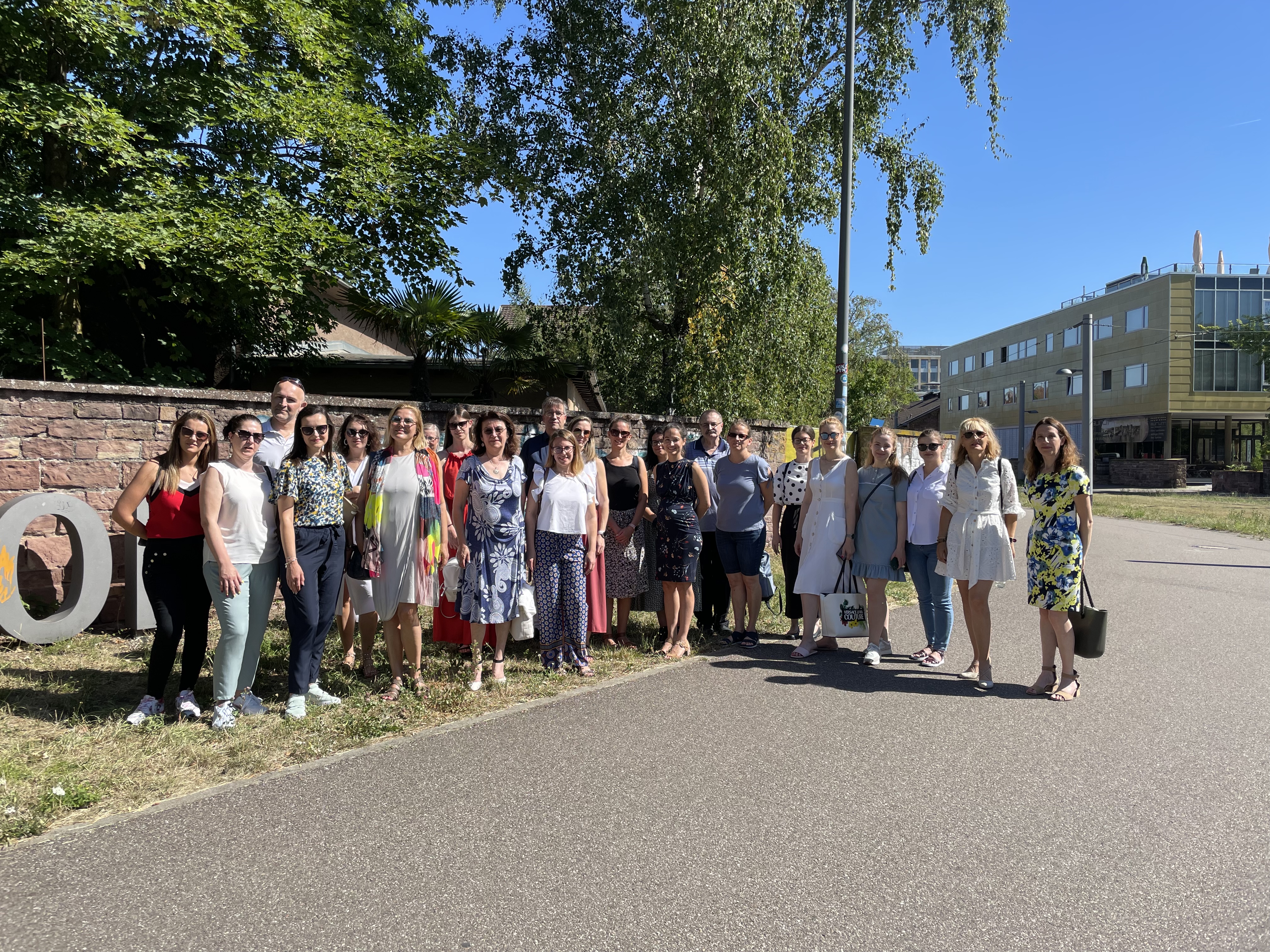 |
|
©copyright: Katrin Brehm
|
|
A lot has happened during the summer and we are glad to present you the highlights.
Besides, as RESTART_4Danube is in its last implementation period – the project will end in December – many activities are now completed, which means we have a lot of results to share!
We hope you will enjoy the reading and wish you all the best!
|
|
| |
|
City-study tour in Villach, Austria (Part 1)
|
| |
|

|
|
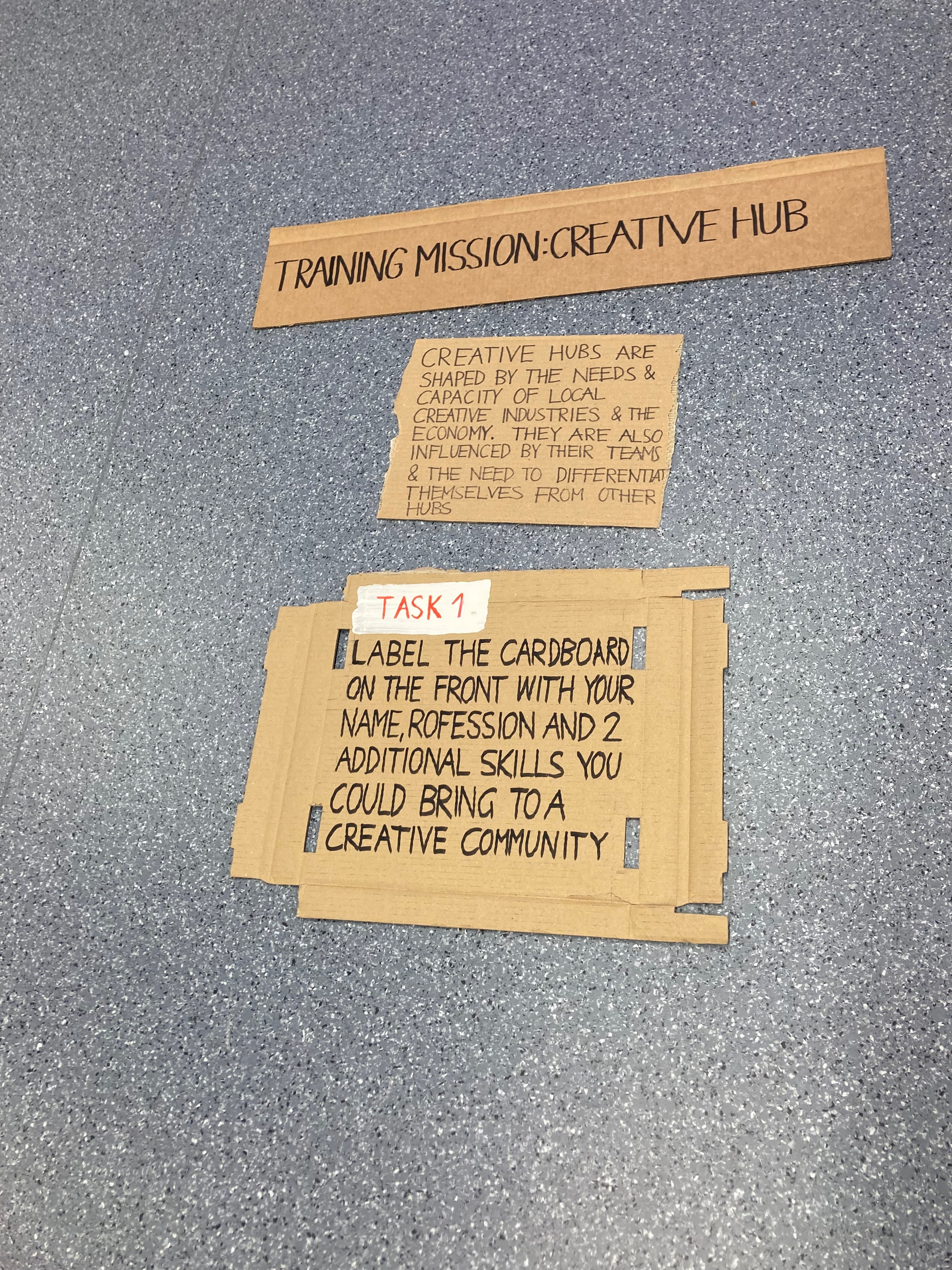
©copyright: Dr. Clémentine Roth
|
|
On 22-23 of June 2022, CUAS welcomed the consortium in their beautiful town of Villach. The program of our Austrian team started with a training on “Creativity & Urban Governance” for project partners and local stakeholders, focusing on regeneration of public spaces, industrial vacancies and sustainable use of existing infrastructure. The training insisted on the positive effects of the CCIs for a sustainable, competitive and innovative urban and regional development. The participants also worked on the needs and possibilities of a local creative hub.
After that, a city tour started in the technology park Villach, where CUAS is also located. The Technology Park Villach (https://villach.at/stadt-service/technologie-innovation/technologiepark-villach) is a key player in innovation in the region of Carinthia and beyond. There are 40 national and international companies located here, the majority of which working in the sectors of research and development, innovation and technology. We visited the CUAS Gründergarage [garage of the founders] (https://blog.fh-kaernten.at/gruendergarage/), which proactively supports innovative and creative founders with expertise, infrastructure and a sustainable and renowned network, which are crucial factors for successfully founding a company; and build! Gründerservice (https://build.or.at/), which promotes and strengthens the start-up scene in Carinthia with various initiatives.
On the second day of the city tour, we visited Infineon Technologies Austria AG (Video: https://www.infineon.com/cms/austria/de/ueber-infineon-austria/), a world renowned and leading enterprise for semiconductor solutions. Infineon has invested a total of 1.6 billion Euros in the Villach site in recent years, making it the largest private investment in Austria and one of the largest all over Europe in this branch.
Finally, we walked through the city of Villach guided by a member of the city marketing department (https://www.cityimpulse.at/) to see what the city has already achieved in the creative and cultural industries, innovation, sustainability and urban development.
|
|
| |
|
City-study tour in Karlsruhe, Germany (Part 2)
|
| |
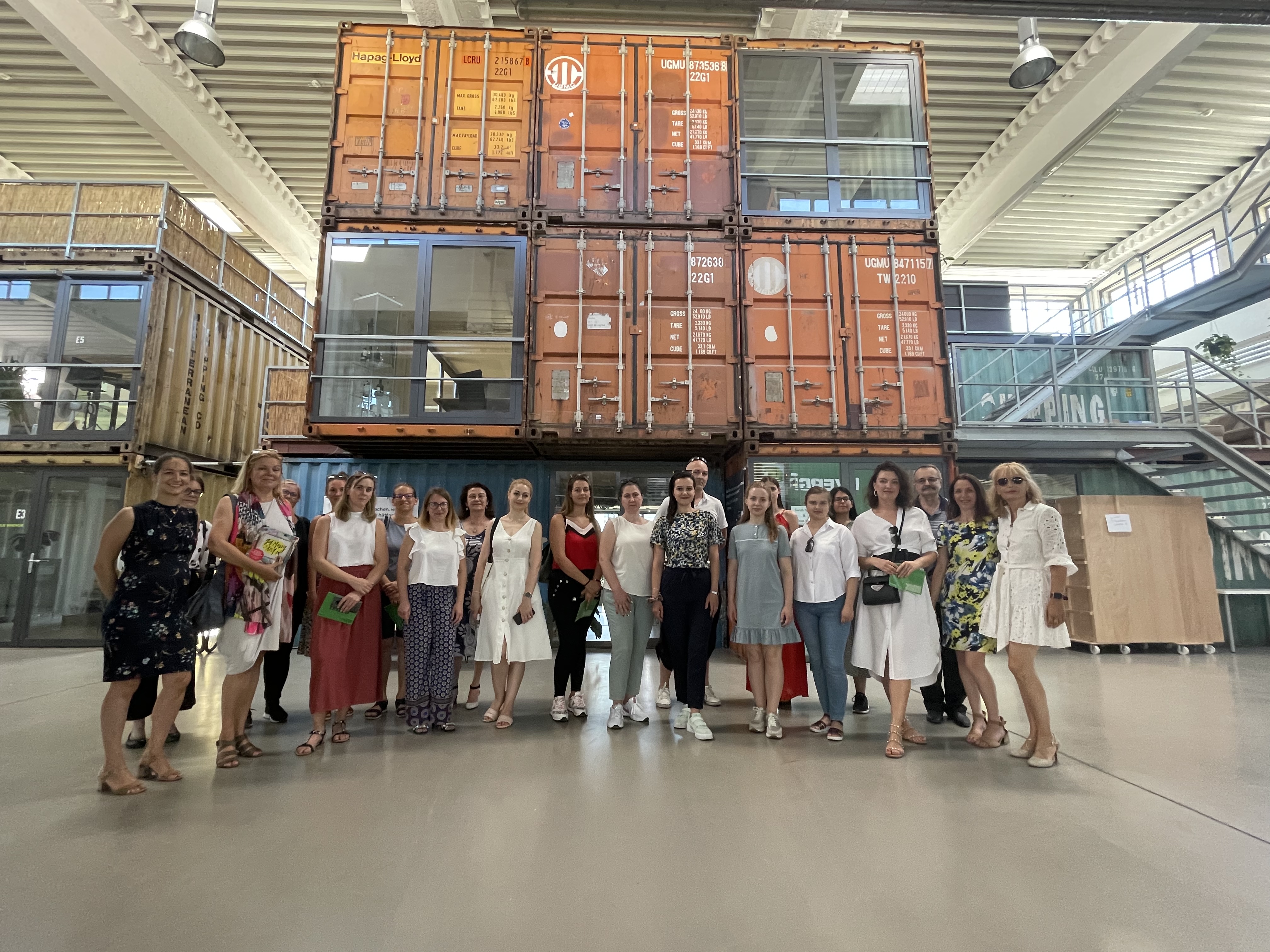 |
|
©copyright: Katrin Brehm
|
|
On 19-20 July 2022 Steinbeis 2i GmbH invited the RESTART_4Danube consortium to Karlsruhe for another city-study tour. The balance of historical heritage, green spaces, leisure facilities and urban activities won Karlsruhe the title of the most liveable city in 2016. In addition, Karlsruhe won the “EUROPEAN CAPITAL OF SMART TOURISM 2020” competition in the cultural heritage and creativity category (“Smart City of Cultural Heritage and Creativity 2020” https://smart-tourism-capital.ec.europa.eu/karlsruhe-category-winner-cultural-heritage-creativity_en). Finally, this city is the first and only German city to be included in the international UNESCO Creative Cities Network as a city of media art. For these reasons, Karlsruhe represented a very interesting case study for our project.
During their stay, project partners could learn more about the transformation of the old slaughterhouse (Alter Schlachthof) into a creative park supporting CCI companies. After a short introductory presentation, Katrin Brehm from the K³ Kultur- und Kreativwirtschaftsbüro Karlsruhe walked us through the different buildings: From the start-up incubation in Perfekt Futur (a former pig market) where CCI entrepreneurs get an office in shipping containers, to their further development in the centre for growth & consolidation and centre for creative spaces. The entire area, which has been successively renovated in the last 15 years, also contains workshops, cafes as well as concert halls and a space for artists. The consortium had the opportunity to exchange with two founders: Marius Krämer who presented the heyvie app https://www.perfekt-futur.de/de/haive-ug that provides neurocentric training to fight pain and migraines as well as Caylee Grey from Get Messy Art https://www.perfekt-futur.de/de/get-messy-art.
The Karlsruhe tour also led us to GoodSpaces https://goodspaces.de/karlsruhe/steamwork/– a coworking space that opened its doors in March 2022 in the buildings of a former steam workshop (alte Dampfschreinerei). The consortium could enjoy the facilities provided to the co-workers with Wi-Fi, well-equipped conference rooms and tasty gastronomy as we took part in a workshop in the frame of the Creativity World Forum. The entire area, which combines tradition and modernity in a very nice way, is offering working and community space to boost creativity, ideas and social impact.
The RESTART_4Danube consortium made an nlyne excursion to the neighbouring city of Mannheim, where Dr. Matthias Rauch who heads the Cultural Innovation & Creative Economy Department of NEXT MANNHEIM https://next-mannheim.de/en/ presented a number of concrete cross-sectoral projects at the intersection of art, music, medicine, technology and innovation.
Finally, another highlight of the city tour consisted in the visit of the Centre for Art and Media Karlsruhe (ZKM) https://zkm.de/en , a world-renowned and unique cultural institution that is way more than a museum. ZKM brings art and technology together – two fields in which the city of Karlsruhe has a long tradition. ZKM is a centre for producing/developing new forms of arts as well as a centre giving the possibility to use new forms of technology. The consortium could catch a glimpse of several temporary exhibitions (BioMedien; The Artwork as a Living System) with interactive, playful and thought-provoking artworks. ZKM is a further example of urban regeneration as it is hosted in a former munition factory.
|
|
| |
|
Creative Danurban Competition
|
| |
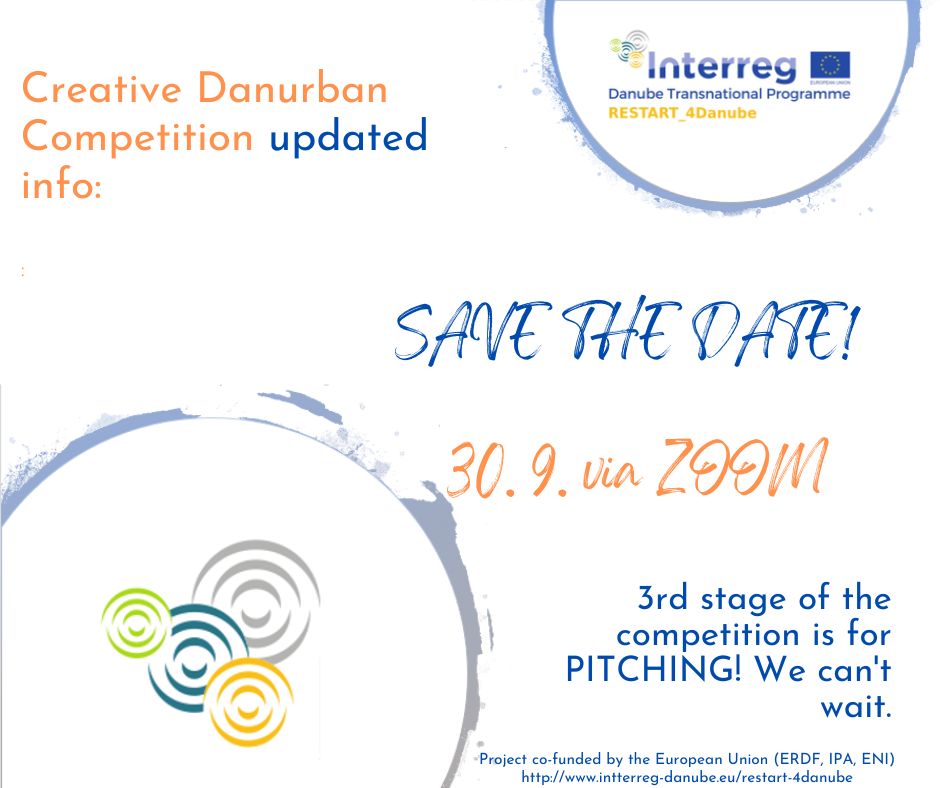 |
| |
|
The second stage of the Creative Danurban Competition was concluded on 31 July 2022. The contestants who submitted their Expressions of Interest during the first stage of the competition and were invited to the second stage further elaborated their ideas. The contestants could submit ideas under the following three main topics:
1- Urban regeneration – green or nostalgic?
2- Spaces and places – old or new?
3- Coming and going – the art of transition.
We received 14 applications out of the 17 that were invited to the second stage. The third and last stage of the competition consists in a pitching session: The competitors will have a designated amount of time to pitch, that is to present, their ideas and convince the jury that their idea is the best.
This final task is the true test of how ready the contestants are to present and defend their ideas in front of an international jury.
The big day for out contestants is going to happen on 30 September 2022, starting at 13:00 CET. The competitors, the jury and the interested public will meet online via Zoom.
The Zoom link → https://zoom.us/j/97876802904 ← is open for all who wish to cheer for the best ideas.
|
|
| |
|
Urban Innovation Management trainings
|
| |
|
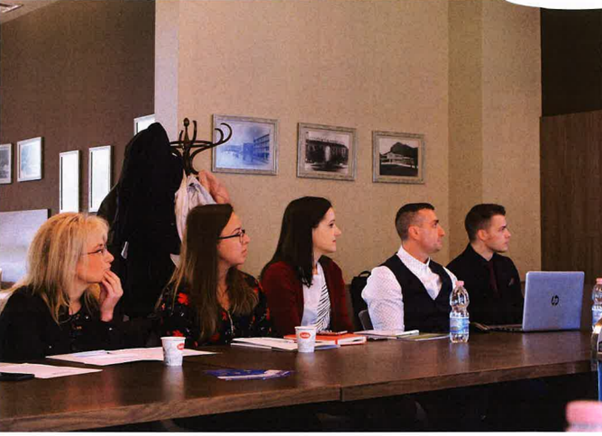

|
|
Urban Innovation Management trainings were held in April, May and September in Vratsa, Bucharest and Nova Gorica. The training content was delivered by CCE, while the organisation part was on the training hosts. Restart_4Danube project aims to improve the transnational and institutional cooperation, to improve stakeholder capacity through local action plans, and to support the implementation of innovative public policies aimed primarily at supporting innovative SMEs in the creative industries. Unfortunately, due to the complicated situation, the trainings were in a hybrid format. Despite the difficulties, all project partners maintain constant contacts as to ensure the implementation and sustainability of project activities. The events were attended by representatives of different institutions, local authorities, business support organizations, SMEs and entrepreneurs in the field of creative industries. The discussion was held in local languages, while training part was on English.
|
|
|
|
| |
|
Building the capacities of CCI organizations through Readiness Level Audits
|
| |
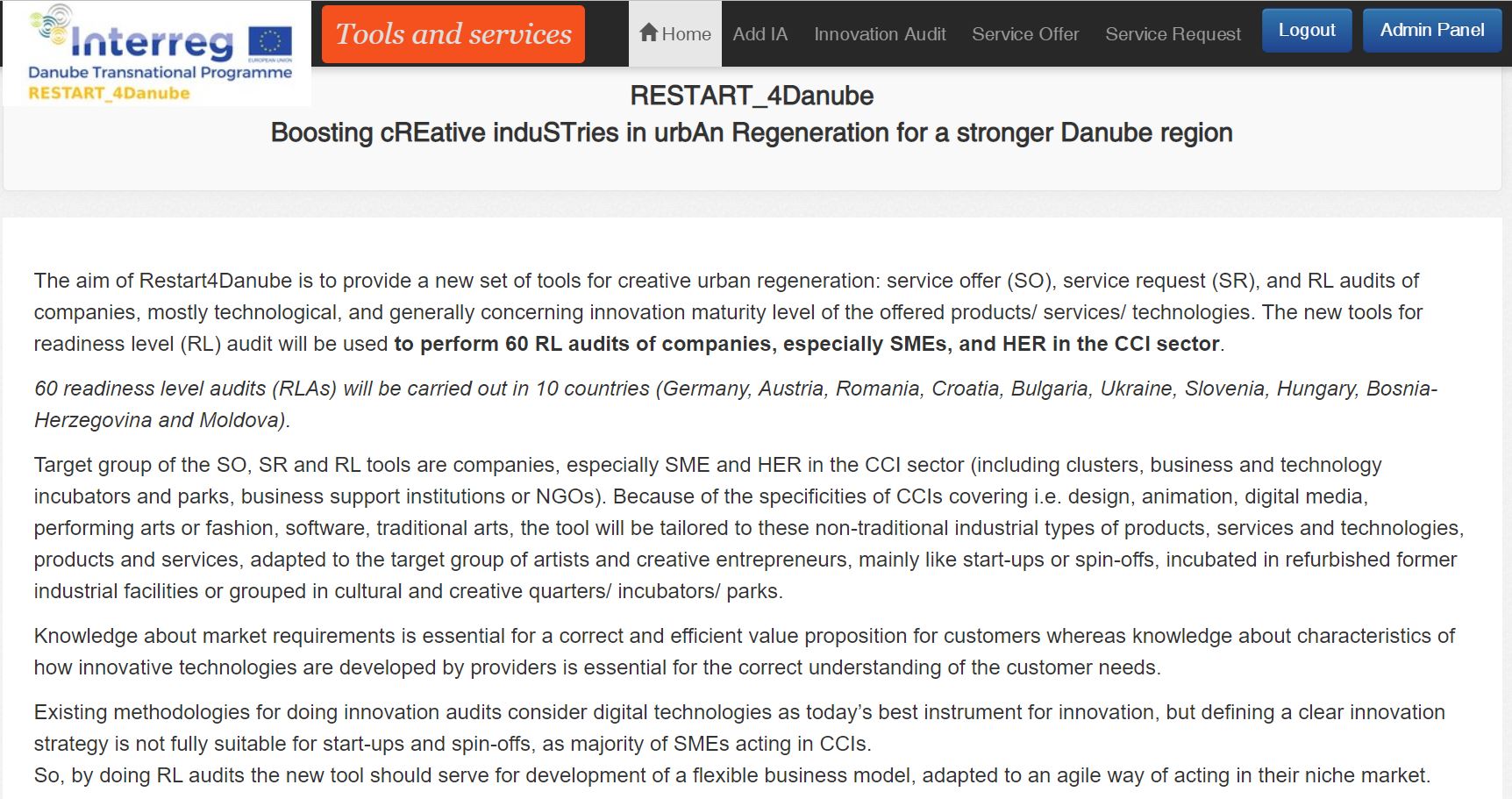 |
| |
|
During the first half of the year (January-June 2022), RESTART_4Danube project partners carried out a total of 65 “Readiness Level Audits” (RLA) based on a methodology and tools prepared by IPA Craiova.
The role of RLAs is to assess the innovation capacity of an organization in the field of CCI. These audits were beneficial both for the project partners who identified needs and ways to offer quality services but also and especially for the audited organizations as they were given the opportunity to identify ways to improve their skills, competitiveness, added value and their own performance.
The audited organizations can be divided into four industrial categories. Most of them deal with Industrial 1 (advertising, architecture, art, performing arts, folk art, folk traditions), closely followed by Industrial 2 (R&D, software, toys and games) and 3 (production of innovative products and equipment) and services). The last category, Industrial 4 (consultancy and project management, business incubation and technology) is not to be neglected however.
The auditing process consisted in a semi-structured interview with organization member(s) on the basis of a questionnaire (comprising 25 questions) with a 5-point Likert-scale. The interview was followed by a quantitative and qualitative analysis from project partners. Each audited organization received specific and personalized recommendations. Project partners were recommended to establish a reasonable/realistic action plan with concrete targets to reach and maintain contact with the audited organizations for the implementation of the recommendations.
|
|
| |
|
Service Offer (SO) and Service Request (SR) - Report
|
| |
|


|
| |
|
RESTART_4Danube aims to improve the conditions for and level of cooperation by developing open innovation tools that match the needs of companies with the expertise of innovative organizations in the fields of Cultural and Creative Industry (CCI) and urban regeneration.
The methodology, template and tool developed in the frame of the project aims to “transform” products/services/technologies, R&D results and intellectual capital assets into marketable innovative products, processes and services. Changing the mentality of artists, cultural creators or creative individuals from the artistic starting point of ideas, in order to envisage commercialization aspects, based on entrepreneurial training/ continuous education is one of the keys to success.
In 2022, project partners supported the publication/realization of 15 service offers (SO) and 10 service requests (SR) of enterprises, especially SMEs and other entities trough the Centre for Technology Transfer CIFATT Craiova https://ipa.t2s.cloud. The gathered SO and SR covered diverse fields of activities: restoration of historic monuments, art photos & digital art, IT and telematics, urban furniture, textile industry and traditions, laser cutting and engraved products, packaging design, augmented reality mobile applications.
We strongly recommend the organization of business meeting opportunities and matchmaking actions (e.g. brokerage events, happening during some technical fairs or other conferences, seminars, workshops, exhibitions with CCIs thematic/areas of activity) to unleash the great potential for cooperation in the Danube region.
|
|
| |
|
Local Action Plan in Craiova, Romania – New spaces for experimentation, innovation and entrepreneurship in CCI sector
|
| |
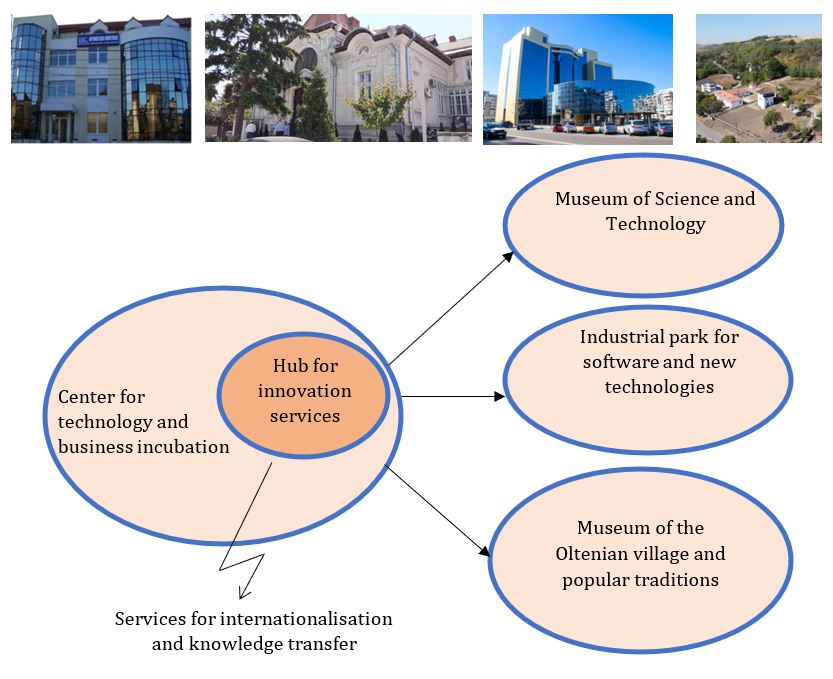 |
| |
|
The Romanian LAP supports the development of regional cultural & creative industries, which is one of the priorities of the regional innovation strategy for smart specialisation (RIS3). IPA Craiova and the municipality of Craiova are cooperating to support creative industries in Craiova and integrate an international dimension notably through the establishment of a hub for innovation services. This LAP focuses on the regeneration of places and infrastructure to support the physical and economic regeneration of urban areas.
The implementation of the planned actions are running smoothly so far: all actions were approved by the Local Administration and will be financed by the Regional Operational Plan.
Here is a summary of the actions (both completed and ongoing):
Centre for technology and business incubation
- Define objectives in relation to the financing program (completed)
- Introduce the objective within the Local Strategy and RIS3 (completed)
- Receive the approval for funding (completed)
- Purchase land (completed)
- Obtain construction permits and realize the technical project (ongoing)
Museum of Science and Technology
- Define objectives in relation to the financing program (completed)
- Find suitable location (heritage building) for the museum (completed)
- Receive the approval for funding (completed)
- Obtain authorizations and implement the building modernization project (ongoing)
Industrial park for software and new technologies
- Define objectives in relation to the financing program (completed)
- Find suitable location (completed)
- Receive the approval for funding (completed)
- Obtain authorizations and realize the building modernization project (ongoing)
Museum of the Oltenian village and popular traditions
- Define objectives in relation to the financing program (completed)
- Get approval of the County Council regarding the achievement of the objective (completed)
- Find suitable location (completed)
- Carry out the feasibility study and geodetic works (ongoing)
|
|
| |
|
Smart City Maribor Initiative (SCMI)
|
| |
|
The Smart City Maribor Initiative (SCMI) was created with the aim of promoting the sustainable development of the smart city environment, innovation in the city of Maribor and the development of pilot projects that will enable the implementation of smart city activities (in the field of smart services, technology and products). In the framework of the third and last pilot within the Restart_4Danube project, the city of Maribor has received recommendations for the preparation of the strategy of smart city Maribor in the intersection of mobility, creative industries and smart infrastructure with an emphasis on the priority area of sustainable development of public transport.
In the field of mobility, it was recommended to focus on comprehensive smart traffic routing, as traffic is one of the factors that contribute a lot to pollution, especially in areas with heavy traffic, e.g. in the city center. The smart city strategy in the field of mobility is aimed at reducing pollution caused by traffic (air, noise...). The primary goal is to reduce the number of vehicles in traffic, increase the share of alternative sources of propulsion, increase other forms of mobility for shorter distances (cycling, walking...) and improve the attractiveness and efficiency of public transport. Potential actions named were the introduction of smart traffic lights with real-time adjustment (priority for emergency vehicles, buses), smart parking lots (information boards, information about occupancy via the application, connection of data from all parking lots) and encouraging the use of alternative forms of mobility.
Regarding creative industry (a set of autonomous sectors whose activities are aimed at the production of intellectual products and cultural values, which are based on human creativity, and at the same time stimulate the economic process, forming a bridge between art, culture, business and technology), recommendations consisted on one side in strengthening the integration of creative industries with advanced industries, understanding cultural and creative industries as creators of great economic value and hence changing the paradigm established today, which pushes the sector into the background. On the other side, it was recommended to create opportunities for mutual acquaintance and understanding, as cultural and creative industries and advanced industries must meet and recognize each other first to find a coordinated, specific and practical interest that enables fruitful cooperation.
Lastly, smart infrastructure undoubtedly represents the heart of the cities of the future. Precisely technology (with a change in the way of thinking) means a crucial leap in the efficiency of the city for a better life of the inhabitants, which is often driven by background data. In this regard, recommendations focused on transport infrastructure, supporting connectivity (everything and everyone is connected to everything else) and make use of all types of waste: not only garbage, but also excess energy or food. As an example, only by adapting traffic lights to real traffic flows, for which all the technology has been available for a long time, can reduce pollution, fuel consumption and save time for drivers.
The Municipality of Maribor is now intensively preparing the Smart City Maribor 2030 Strategy, in which the recommendations are integrated.
|
|
| |
|
The Municipality of Vratsa conducted an "Awareness raising campaign for the promotion of green urban spaces and historical heritage" under the "RESTART_4Danube" project
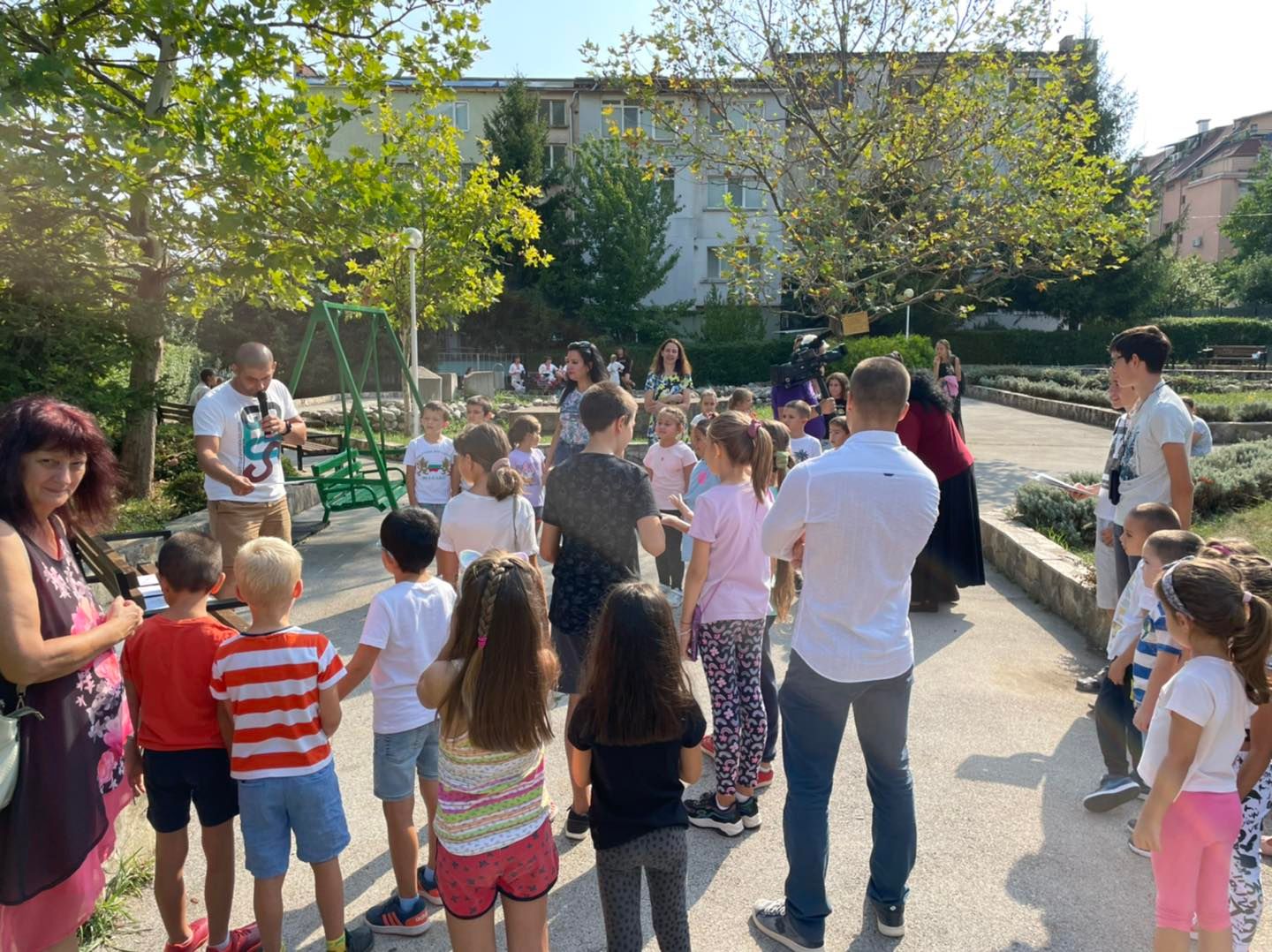
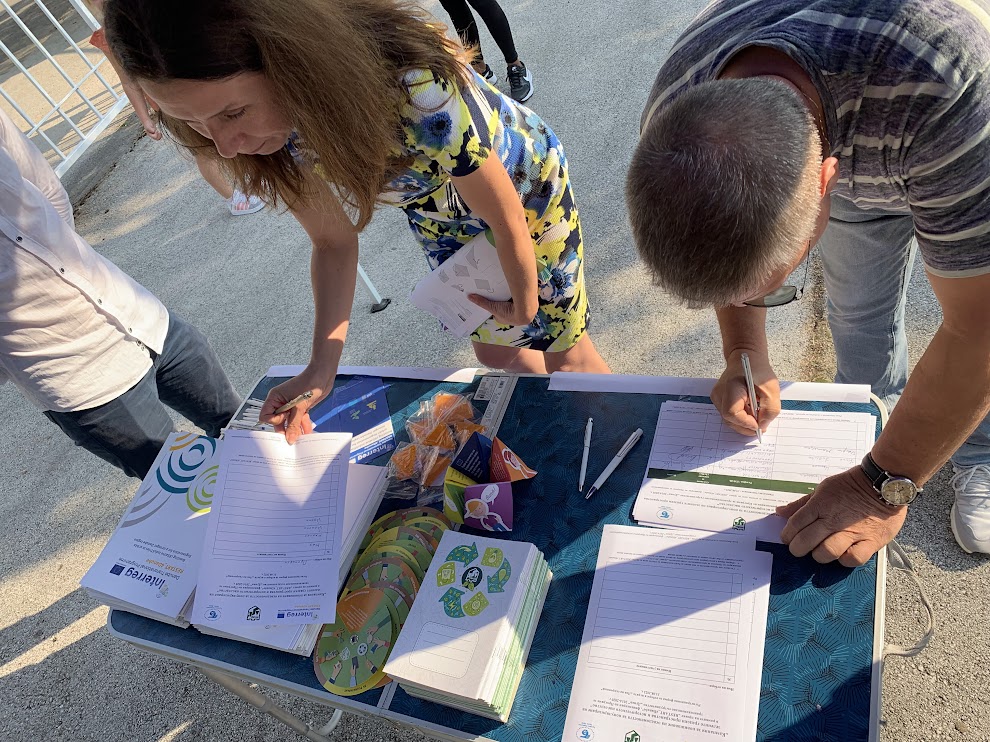
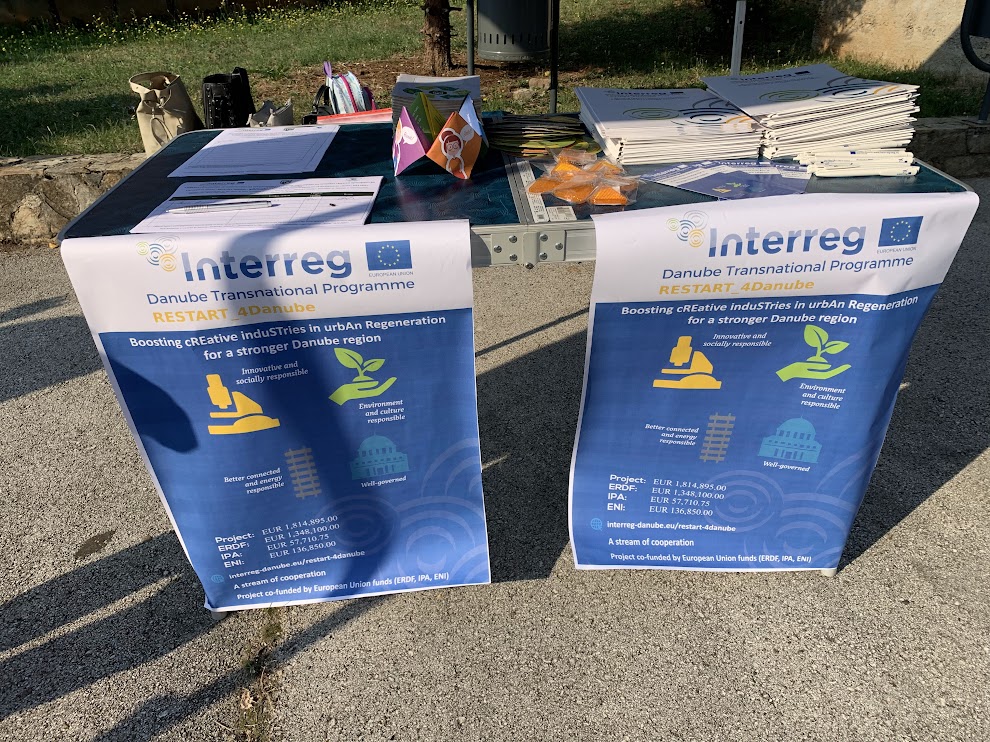
|
| |
|
On August 31 (Wednesday) at 9:30 a.m., an "Awareness raising campaign for the promotion of green urban spaces and historical heritage" was held in the "Mogilanska Mogila" /Mogilanska Moud/ archaeological park. The event was organized within "RESTART_4Danube" project, implemented with the financial support of the European Union, through the Transnational Cooperation Program "Danube" 2014-2020. The Municipality of Vratsa is a project partner and implements Local Action Plan 5 - Green Urban Regeneration, within which the event was organized as part of the activities in the LAP. The main objective, strategy and results of the project were presented to improve transnational and institutional cooperation in the field of creative industries, to renew the urban areas of the Danube region and to develop five Local Action Plans in Craiova (Romania), Rijeka (Croatia), Maribor (Slovenia), Vas County (Hungary) and Vratsa (Bulgaria).
The project management team had set up a special "RESTART_4Danube" marquee where the event guests could get more information and promotional materials about the project.
The activities that were implemented through the event include:
- Presentation of the projects related to the improvement, restoration and renovation of the "Mogilanska Mogila" park of the Municipality of Vratsa;
- Information campaign about the benefits and needs of urban green spaces, their maintenance and the activities that every citizen could do for the better parks of Vratsa;
- Presentation of historical information about the mound by a tour guide from Regional Historical Museum - Vratsa
- Distribution of promotional materials that in an attractive way to present the necessary information for the protection of green urban spaces and their importance;
- Conducting a "Treasure hunt" game for children and teenagers, related to the protection of the parks and the cultural and historical heritage of "Mogilanska Mogila" park;
- Performing a theatrical production that promotes green spaces and historical places in the urban area.
- Recital, traditional songs and dances by children from kindergartens;
- Presentation of projects related to the environment, development of creative industries and green spaces from CCI-Vratsa;
- Conducting of an external class in fine arts in the park.
The event was organized by the Municipality of Vratsa with the support of the Chamber of Commerce and Industry - Vratsa and participants from the Youth House - Vratsa, Youth Center - Vratsa, Regional Historical Museum - Vratsa, Kindergartens "Sun", "Happy Childhood", "Nightingale", Europeans", Innovative Secondary School "Father Paisiy", TEMP Theater Group, People's Community Center "Far 1930" - village of Pavolche, Community Center "Ognishte -1930" - village of Chelopek and employees of the local administration.
|
|
| |
|
Multi-million Euro partnership for culture and creativity launched: EIT Culture & Creativity
|
| |
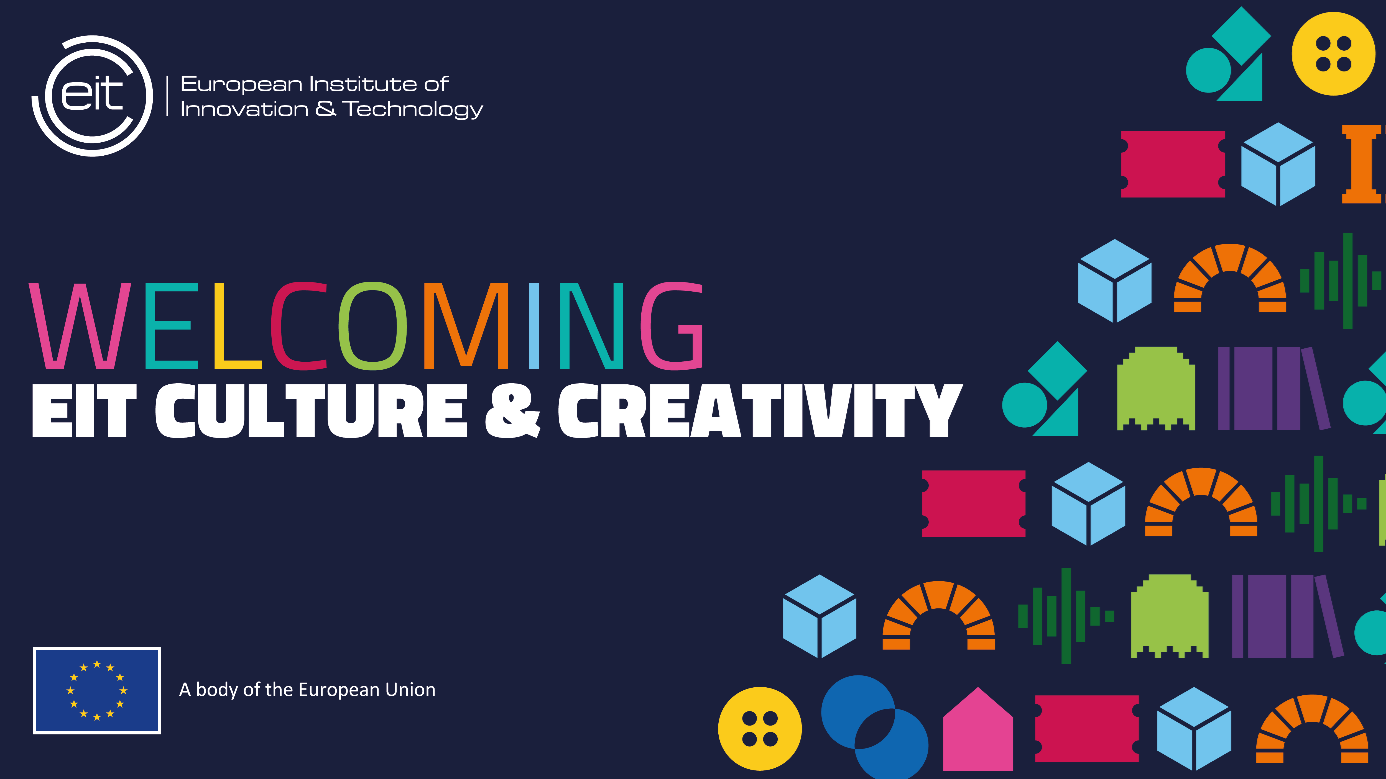 |
|
©copyright: EIT Culture & Creativity
|
|
The consortium "Innovation by Creative Economy (ICE)" under German leadership (Fraunhofer-Gesellschaft) won the tender for a new Knowledge and Innovation Community (KIC) in the cultural and creative sector. The winning team consists of 50 partners from 20 countries.
The new pan-European partnership can expect to split approximately EUR 300 million of EIT funding under the Horizon Europe programme with the possibility to leverage more funds from the private and public sector. The consortium has received start-up funding from the German Federal Ministry of Education and Research (BMBF) and is to be headquartered in the German region of North Rhine-Westphalia. Other locations are the Netherlands, Finland, Italy, Spain, Austria and Slovakia.
The new KIC will train the sector's future entrepreneurs, drive its innovative ventures and deliver innovative solutions to the challenges ahead. It will fill regional innovation gaps and harness the power of these sectors as key drivers of economic growth and job creation to support Europe's cultural leadership. For more information, you can check their factsheet (https://eit.europa.eu/sites/default/files/winning_consortium_factsheet.pdf).
In addition, EIT Culture & Creativity will introduce systemic investments in CCSI to 1) connect innovation value chains at local, regional, national and EU levels; 2) break down barriers to innovation across sectors and disciplines; and 3) equip the next generation of innovators with much-needed entrepreneurial skills.
|
|
| |
|
Successful workshop during Creativity World Forum
|
| |
|
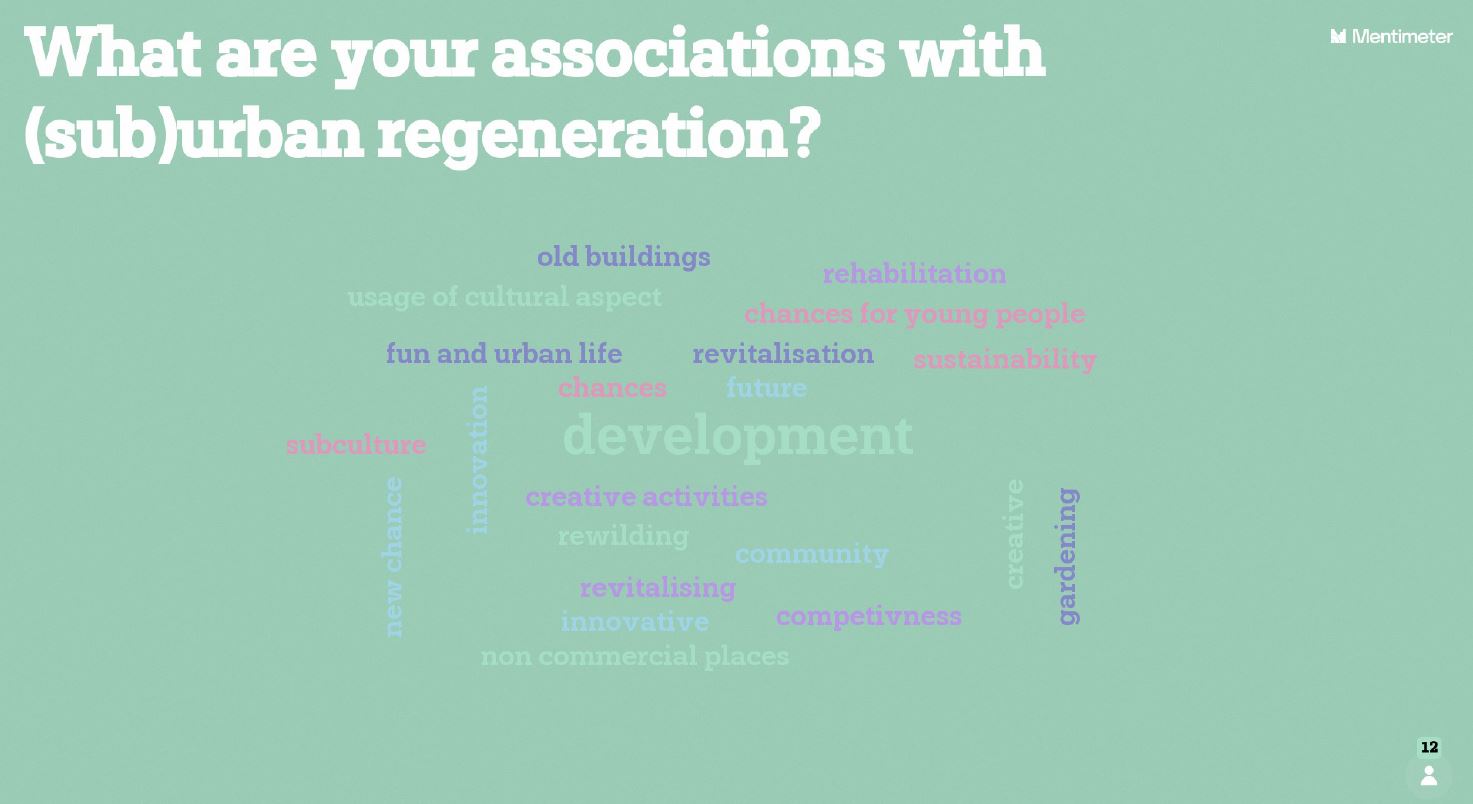
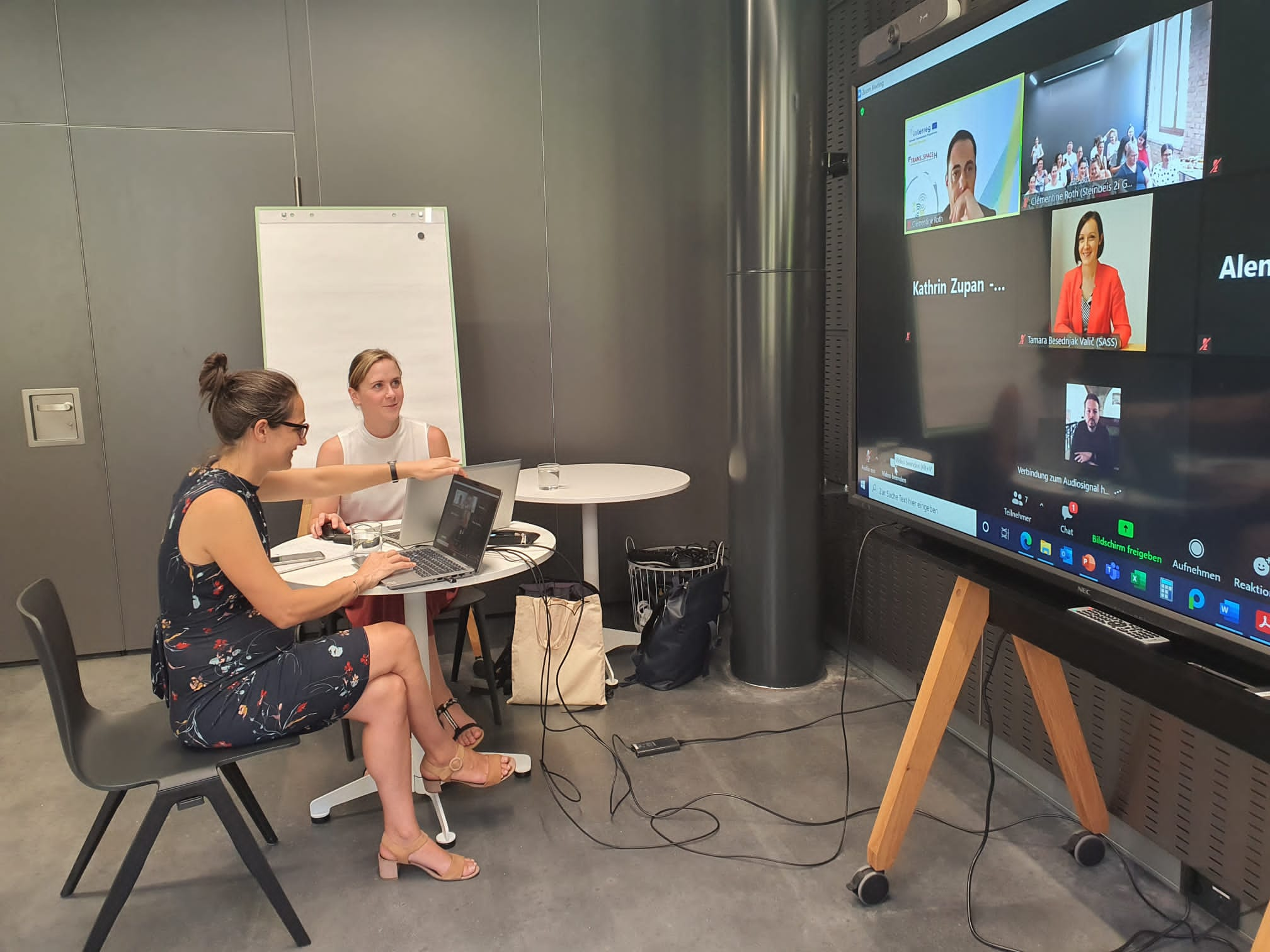
|
|
©copyright: Dr. Kathrin Stainer-Hämmerle
|
|
On 19 July 2022, three project partners – Dr. Tamara Besednjak Valič (School of Advanced Social Studies, Slovenia), Dr. Clémentine Roth (Steinbeis 2i GmbH, Germany) and Kathrin Zupan (Carinthia University of Applied Sciences, Austria) – moderated an online workshop on Fostering sustainable (sub)urban regeneration through digital and creative solutions in the frame of the Creativity World Forum that took place between 18-21 July 2022 in Stuttgart and online.
The team exchanged with the workshop participants about what is sustainable (sub)urban regeneration and why creativity & CCIs are important for suburban regeneration. They successfully raised visibility about the project and presented a number of findings and good practices from the project regarding capacity building, cooperation, infrastructure and access to finance, pointing at challenges, chances and possibilities of sustainable (sub)urban regeneration through digital and creative solutions. The use of Mentimeter and Tamara’s skillful moderation contributed to make this one-hour workshop an interesting and lively event. Thumbs up for the super teamwork!
|
|
 |
| |
|
The car has been out of fashion for a long time, we all know that now. The European Mobility Week has been organised under the sponsorship of the European Commission since 2002, and Maribor has been involved in its implementation since the very beginning. Every year, between 16 and 22 September, Slovenian municipalities join this pan-European campaign in large numbers. Over the years, the initiative has grown not only in numbers, but above all in the quality of the actions implemented. In addition to the promotional activities to promote sustainable mobility, more and more permanent actions (i.e. actions that contribute to facilitating the transition from the private car to more sustainable travel modes and that remain in place for the purpose of promoting sustainable mobility in space) can be observed year after year, such as newly built or improved pedestrian and cycling infrastructure, new public transport lines, improved public transport stops and stations, public bicycle and public car schemes, pedestrian signposts, benches, cycle racks, other urban amenities, removal and redesign of parking spaces, traffic calming in settlements, etc. This year the European Mobility Week's slogan in Sustainably Connected.
We have been celebrating sustainable mobility for more than 20 years. Every year, more of us are in favour of healthy mobility.
How did the car become the enemy of the good life?
Every day, climate change is brewing on our roads, traffic accidents are occurring, red lights are flashing as the numbers of sick people are rising, and sleepless nights due to noise are on the increase. Behind all these harmful consequences is motorised traffic, which lowers quality of life and increases the risks of many unwanted effects. All of this could be avoided through the deliberate use of sustainable mobility, which opens the door to more efficient, healthier and above all fairer ways of getting around. European Mobility Week is an annual opportunity to change our travel habits.
First organised in France in 1998, Car Free Day was conceived as an opportunity for cities to show their commitment to protecting the environment. Every 22 September, local communities can present their city centres in a different light and carry out key activities aimed at reducing car traffic in specific areas, encouraging the use of sustainable forms of transport, promoting the use of car-free transport and promoting the use of sustainable transport. mobility and raise awareness among residents about the impact of their travel choices.
Over the years, Car Free Day has evolved into European Mobility Week under the auspices of the European Commission. This provides a platform for municipalities to promote sustainable mobility initiatives and raise awareness citizens. Committed local authorities can use this time to build partnerships with stakeholders, to cooperate and network between municipalities, and to introduce new longer-term policies and sustainable mobility measures.
In 2015, the European Mobility Week and the Do the Right Mix campaign joined forces. This brought together activities throughout the year and broadened the range of participants. In addition to municipalities, a wide range of organisations such as schools, public and private companies, associations and any other NGOs or associations are invited to register their activities through the MOBILITY ACTIONS initiative throughout the year. This creates a large community of sustainable mobility advocates of all kinds, who can exchange experiences, ideas and advice.
Project partners from the Municipality of Maribor presented Restart4_Danube project on 20th of September, focusing on promoting their Local Action Plan 3: Transit-Oriented development, where they made an online application for promotion of Culture in Maribor. On this application citizens and tourists can find Cultural events, exhibitions, new books in libraries, etc. Currently, the code for the app can be found on city buses. By participating in the European Mobility Week, we ensure that the promotion of our app is extended to other forms of sustainable mobility, in this case pedestrians and cyclists.
|
|
| |
|
20 years build! Gründerzentrum (Start-up Centre) Successful prospects for the Carinthian start-up scene
|
| |
 |
|

|
|
The build! Gründerzentrum, as part of the creative industry ecosystem, plays a key role in Carinthia's regional economic development by promoting start-ups and securing new jobs in Carinthia. For 20 years now, the Carinthian incubator has been supporting young start-ups on their way to independence and offers them support in various areas. Infrastructure, networking opportunities in industry and business, workshops with experienced experts, coworking spaces and offices - the range of services offered by the incubator is diverse.
Strong pro-active network and services
One of the main focuses of the build! Gründerzentrum is the active networking of the start-ups it supports with industrial and commercial enterprises. In this way, young founders benefit from the practical expertise of numerous mentors, investors and partners. The existing network serves to advance the development of the start-ups and their products. To this end, new projects are constantly being initiated and existing structures adapted to current requirements.
Cooperation and further development of the start-up ecosystem as factors of success
Since the beginning of the year, the Carinthian Start-up Centre has not only been cooperating with domestic players in the scene, but also increasingly across the federal states. "With the regained AplusB funding https://aplusb.biz/ from Austria's largest incubator network, we will be able to take additional measures in the future to advance the successful development of innovative startups," emphasises Jürgen Kopeinig, managing director of the build! incubator. In the course of the AplusB South-West project, the provinces of Carinthia, Salzburg, Tyrol and Vorarlberg have joined forces to combine their strengths, use synergies and jointly set up stimulation activities, support (prospective) start-ups and further develop the start-up ecosystems and network their stakeholders. The funding programme focuses on pre-incubation, female empowerment and green tech.
Contact
build! Gründerzentrum Kärnten GmbH
Theresa Omann, BA MSc
Corporate Communication
Lakeside B01a
9020 Klagenfurt
Tel: +43-46327008741
Tel (Mobil): +43-660-987-6028
theresa.omann@build.or.at
www.build.or.at
https://www.linkedin.com/company/build-gruenderzentrum/
https://www.facebook.com/gruenderzentrum/
|
|
| |
|
Creative start-up Solution Zero
Innovative next generation building materials and products - roof tiles to combat global warming!
|
| |
|
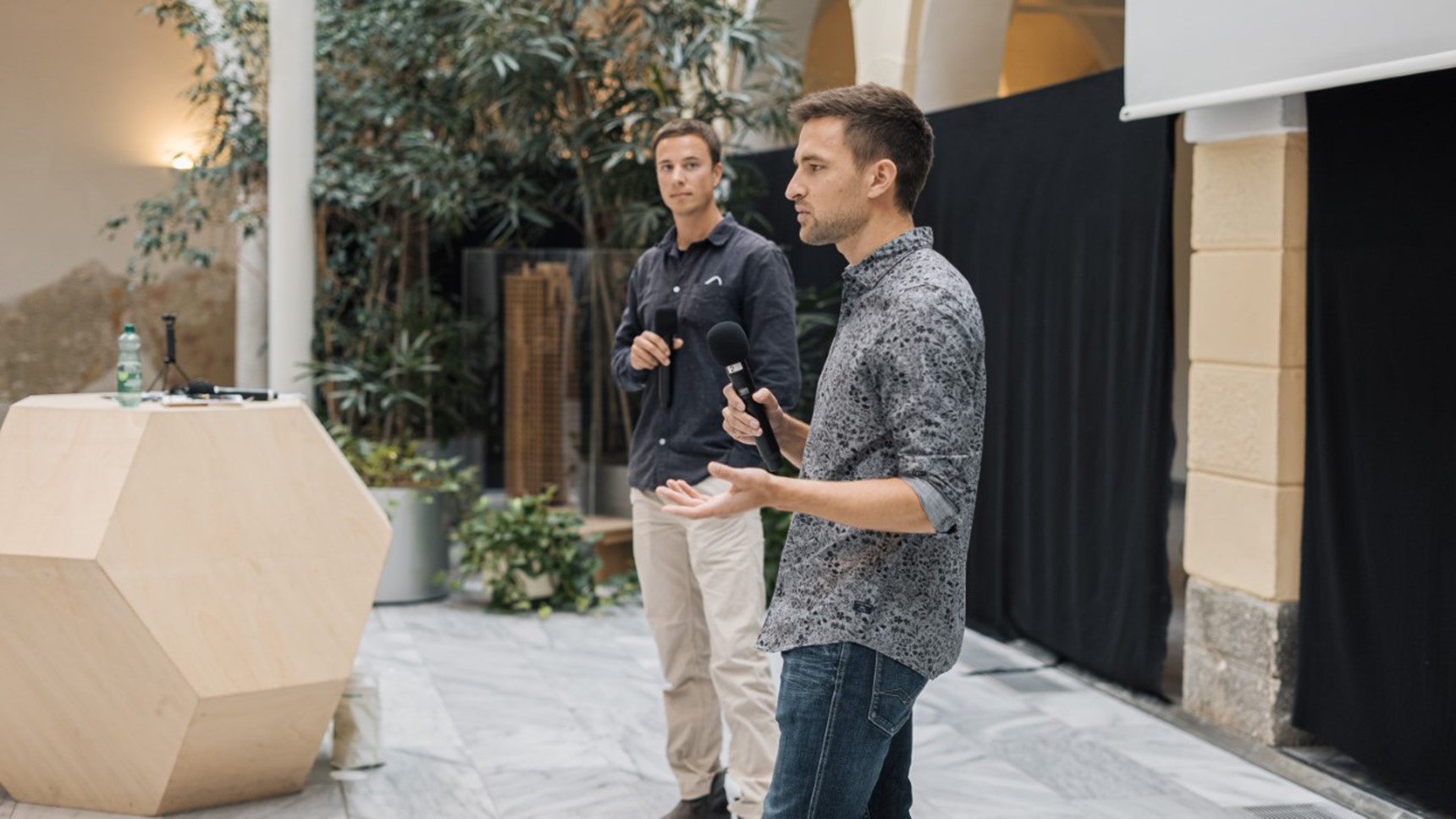
The two entrepreneurs from start-up Solution Zero Joseph Gansger and Julien Presland talking about innovative building materials and next generation building against global warming at an event of the Carinthian University of Applied Sciences.
|
| |
|
Innovative building materials and next-generation building products can support the achievement of European climate goals. The creative industries start-up Solution Zero from the Carinthian University of Applied Sciences Gründergaragen is developing solutions in this field and trying to achieve the goal of zero carbon dioxide.
“Zebra Ziegel" that regulates surface temperatures all year round
While summer heat waves cause scorching temperatures in our cities, two students from the Carinthia University of Applied Sciences (architecture degree programme) are developing a roof tile called "Zebra Ziegel” and thus improves the quality of life in the cities of the future. "As part of our architecture studies, we have been intensively studying the climate crisis and the associated risks, but also the potential opportunities that different types of building and construction offer in relation to the issue for some time now," says Julien Presland, who, together with fellow student and startup business partner Joseph Gansger, is taking on this monumental challenge by questioning conventional building product types in order to rethink or completely reinvent them.
Geoengineering methods to achieve European climate targets
"We developed our roof tile prototype first because in this case, some simple but effective design optimizations can lead to hugely beneficial outcomes, both in terms of household energy consumption and average temperatures in urban environments," Joseph Gansger continues. Recent climate developments are very worrying and our solution must not be to switch to air conditioning, which would only accelerate the viscous cycle of CO2 emissions and global warming. Governments are increasingly considering so-called geoengineering methods to meet European climate targets. The only viable and risk-free approach seems to be to increase the Earth's "surface albedo" by increasing reflectance.
Lived cooperation as a factor for success
Julien Presland and Joseph Gansger use the principles of physics as well as analogies from nature and filed a formal patent application for their roof tile in March 2022, which is currently being processed. The two entrepreneurs are busy taking crucial steps towards fully establishing a business model dedicated to research and development work around various building products as part of the pre-foundation phase of their company. "We have benefited enormously from the cooperation with the Carinthian University of Applied Sciences and the Gründergaragen throughout the development process and look forward to further joint projects in the near future."
Always looking for support!
Contact
Julien Presland
E: eduprejul001@fh-kaernten.at
T: +43 (0)677 64350674
Links
The Gründergaragen (founder garages) from Carinthian University of Applied Sciences
https://www.fh-kaernten.at/en/cuas/innovation-entrepreneurship
Study Program Architecture from Carinthian University of Applied Sciences
https://www.fh-kaernten.at/en/studium/bauingenieurwesen-architektur/bachelor/architecture?gclid=EAIaIQobChMIqJbkhbza-QIVB813Ch202gWSEAAYAiAAEgKWSfD_BwE
|
|
| |
|
Creative Startup heyvie - neurocentric mobile coach for less pain & more resilience
|
| |
|

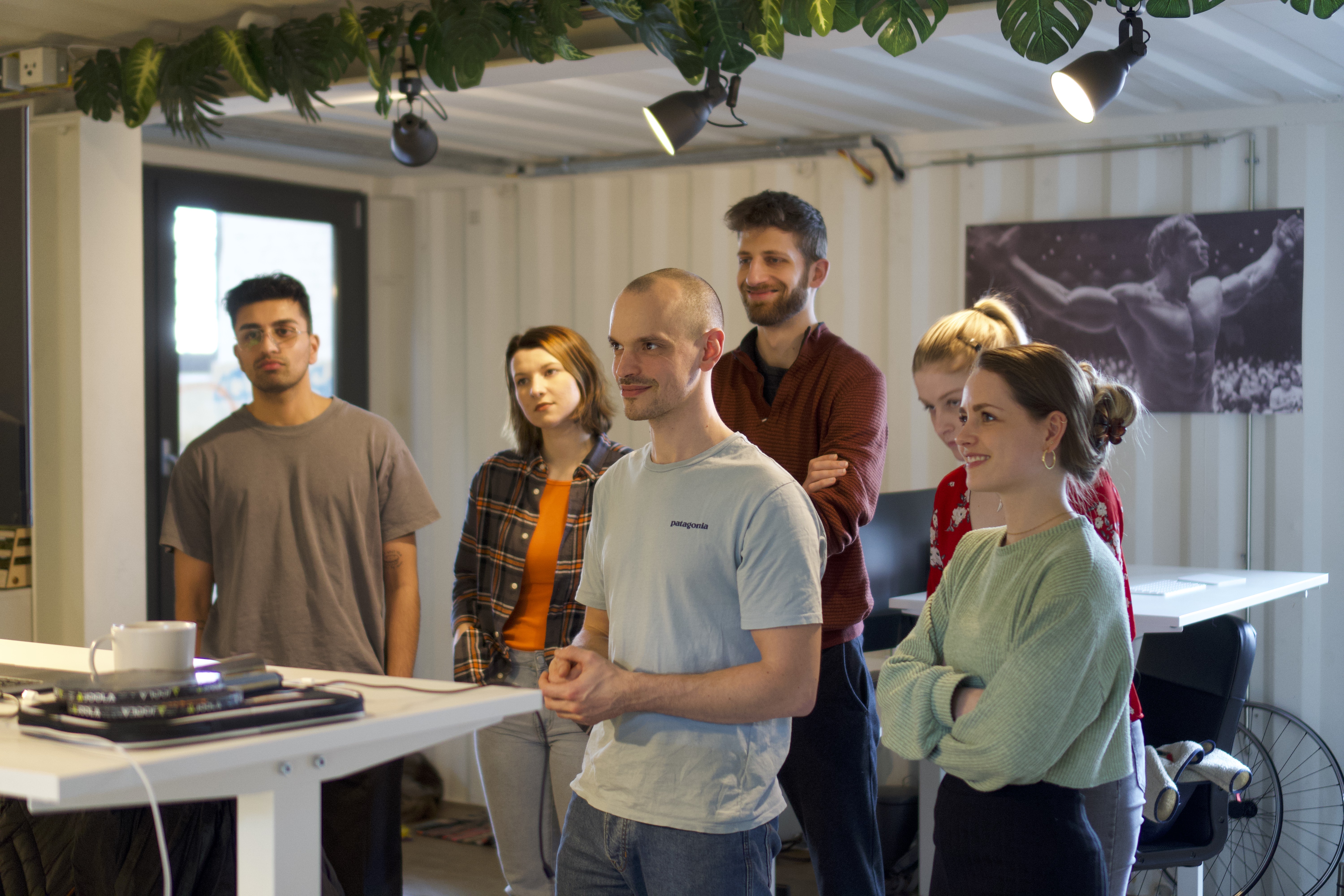
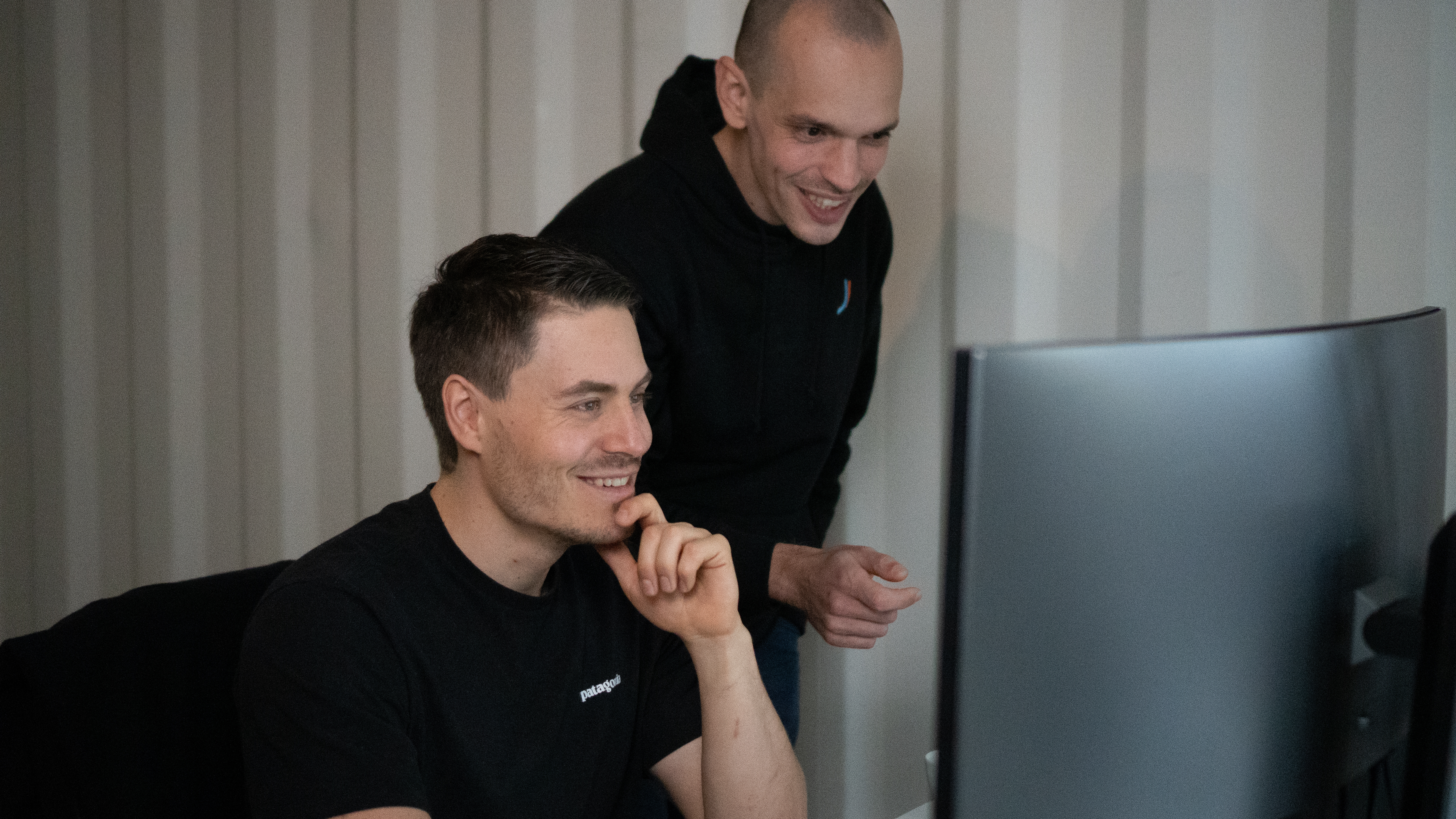
|
| |
|
heyvie is your neurocentric mobile coach for less pain & mor resilience. The center of your body, well-being and health is the brain. By applying breakthrough advances from neuroscience, you can use your brain’s full potential to address chronic pain, mental illness and resilience. Daily on your smartphone.
Tailored to your brain.
heyvie was founded in the midst of the COVID-19 pandemic with a vision of a resilient and pain-free society. Current insights from neuroscience enable breakthrough method to build resilience and harness the full potential of the brain. The two founders, Hady and Marius, started to make this method applicable for everyone.
The idea for heyvie was born in the hometown of the two founders. When things really got going in the summer of 2021, a choice had to be made between Berlin and Karlsruhe. Berlin is self-explanatory. One of the founders had a strong connection to Karlsruhe through his studies. Due to the local ecosystem and Marius’ good network there, the two decided to move to Karlsruhe. They immediately found connections in the programs of the country (Cyberlab, Gründermotor, BadenCampus, Pioniergarage). After a few weeks they heard about the offer of the city of Karlsruhe/K3 in the context of the Perfekt Futur and decided to apply for the leasing a container space there. Within a few weeks, the team moved into Perfekt Futur. The subsidized rent allowed the whole team to be in one office from day 1 and had a super positive impact on the company’s development.
|
|
| |
|
DANURB+ (DANUBE URBAN BRAND+) PROJECT – A JOURNEY CONNECTING COMMUNITIES
|
| |
|
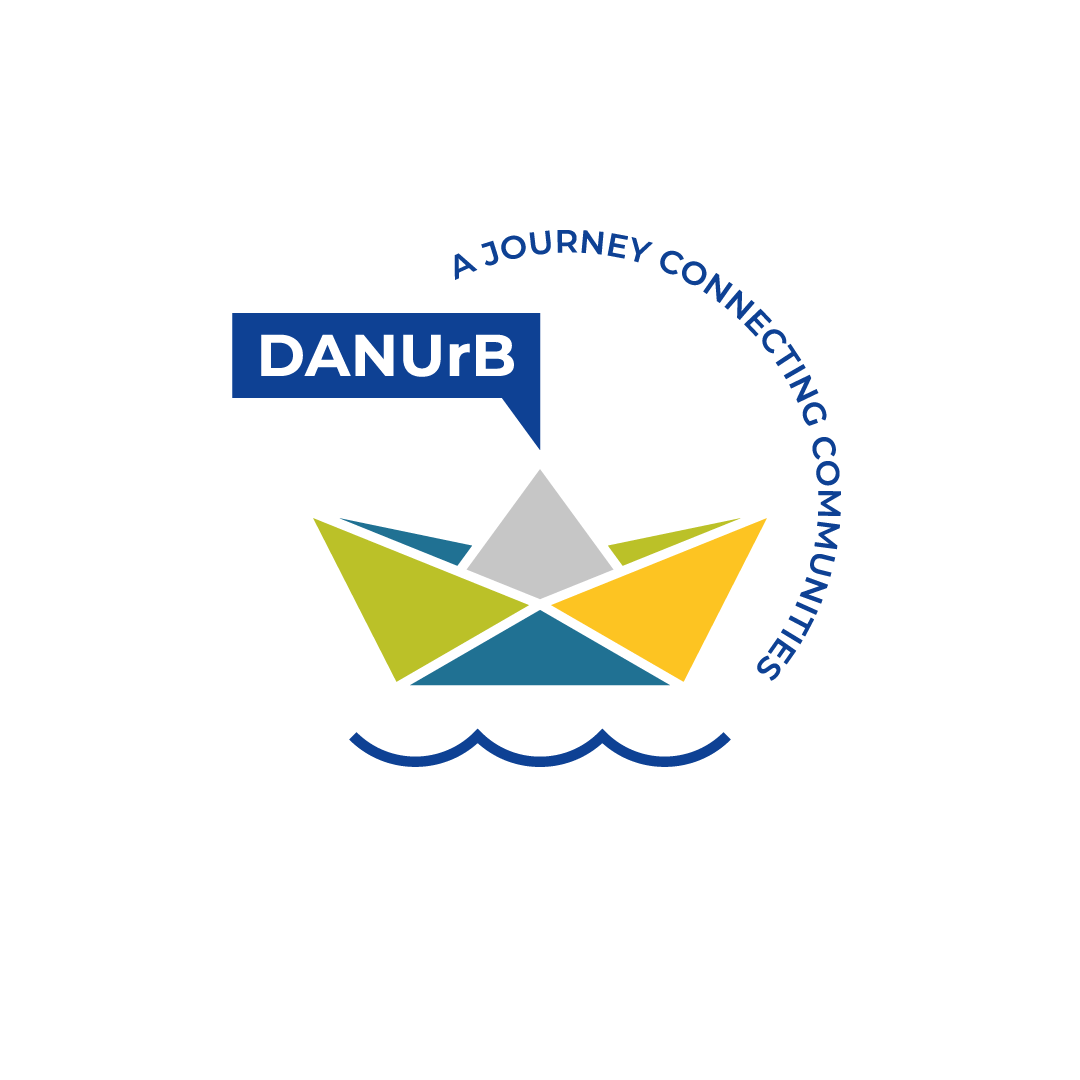

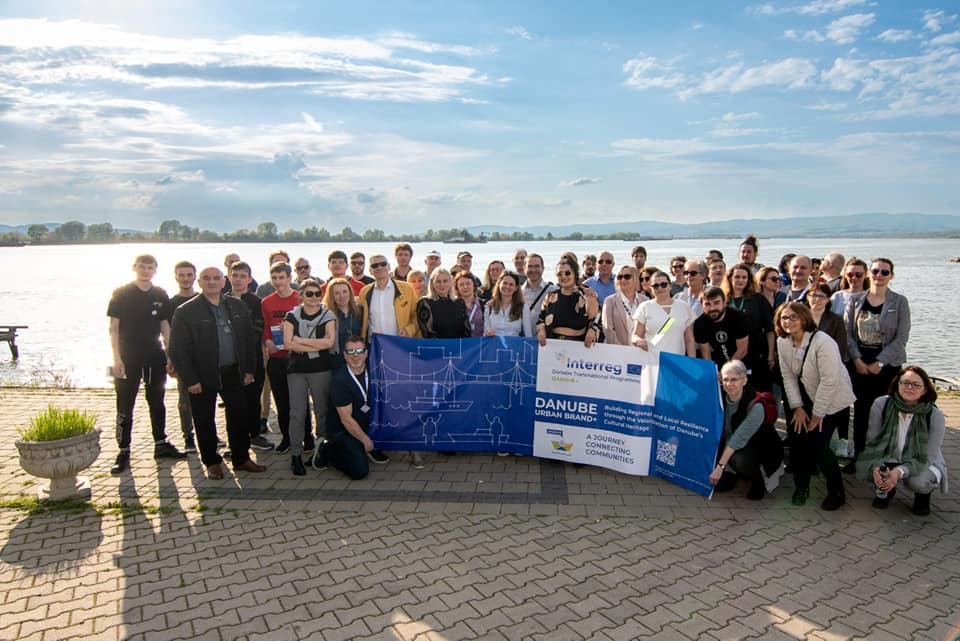
|
| |
|
DANUrB+ was launched to foster resilient use of cultural heritage and resources of the peripheral and border regions along the Danube. It is creating new opportunities for attractiveness in selected settlements and shrinking areas and is activating underused cultural heritage to strengthen the Danube cultural identity. The project activities are further developing a "Danube brand" for cities, providing an opportunity for the better monitoring of tourist movements and spending, and supporting the existing Cultural Routes. DANUrB+ adds value to the Danube cultural identity through planned events such as Danube Days, various publications including an Atlas of DANUrB+ towns and a documentary movie telling 12 stories from 12 different locations, thus connecting the various stakeholders along the Danube. To enhance the value of the cultural heritage along the Danube, the project is increasing the capacity of local stakeholders for cooperation at local and interregional level. A Quality Label is being created, based on shared regional values, as well as a Danube Cultural Promenade that is connecting interregional initiatives along the river to revitalise the cultural heritage. And the ultimate goal is the Danube destination as a Cultural Route through revived urban and cultural heritage sites, and re-activated local communities.
17 ERDF, 2 IPA consortium partners and 23 associated strategic partners from 6 countries are working together to promote the sustainable use of cultural heritage and resources in the Danube communities. The school programmes of the project are educating youngsters about cross-cultural values, encouraging them to discover and appreciate the heritage connected to the Danube River. And through the developed online platform (www.danurb.eu), uniting good practices of cultural/historical heritage, enabling stakeholders to act as one community and to create projects of added value to their communities, we continue our “Journey, connecting communities”.
For further information visit our page and subscribe to our Newsletter: dtp.interreg-danube.eu/approved-projects/danurb_plus/campaigns
Follow us on:
Web platform: www.danurb.eu
Facebook: www.facebook.com/DANubeUrbanBrand/
Instagram: www.instagram.com/danurb_plus/
Twitter: https://twitter.com/DANubeUrbanBran
YouTube: www.youtube.com/channel/UCgdE37NGcNpr6dXrf8SOyVw
PocketGuide DANUrB+ Tours: www.pocketguideapp.com
|
|
| |
|
Final conference of Restart_4Danube on 23-24 November 2022
|
| |
|
If you are interested in how you can contribute to the creative transformation of your city join the Final Conference of the Restart_4Danube Project, to learn how can artists, CCI sector entrepreneurs and municipality work together to create a sustainable living environment for future generations.
The Restart_4Danube project is organising the closing conference, in a hybrid format on 23-24 November 2022.
Over the last 2 years, 25 partners from 12 countries in the Danube region have sought to form international partnerships to develop new types of governance & public policies in an innovative approach combining tandems & follower cities.
At the final conference, the partners will summarize the results, impacts, and lessons learned from supporting municipalities, young artists and creative entrepreneurs to form a public-private partnership to promote SMEs & stimulate creative urban communities.
During the conference you will learn more about the:
- Strategy on Creative Urban Regeneration for the Danube Region in which we present possible activities that could strengthen the regional creative ecosystems in the Danube Region through better cooperation between stakeholders and to support SMEs in the cultural and creative industries (CCIs).
- 5 Local Action Plans and the main achievements made during their implementation.
- The winners of the Creative Danurban Competition.
Follow us for more details regarding the final event.
RESTART_4Danube: https://dtp.interreg-danube.eu/restart-4danube
https://www.facebook.com/Restart4Danube/
|
|
| |
|
RESTART_4Danube in a nutshell – our implementation brochure is coming soon!
|
| |
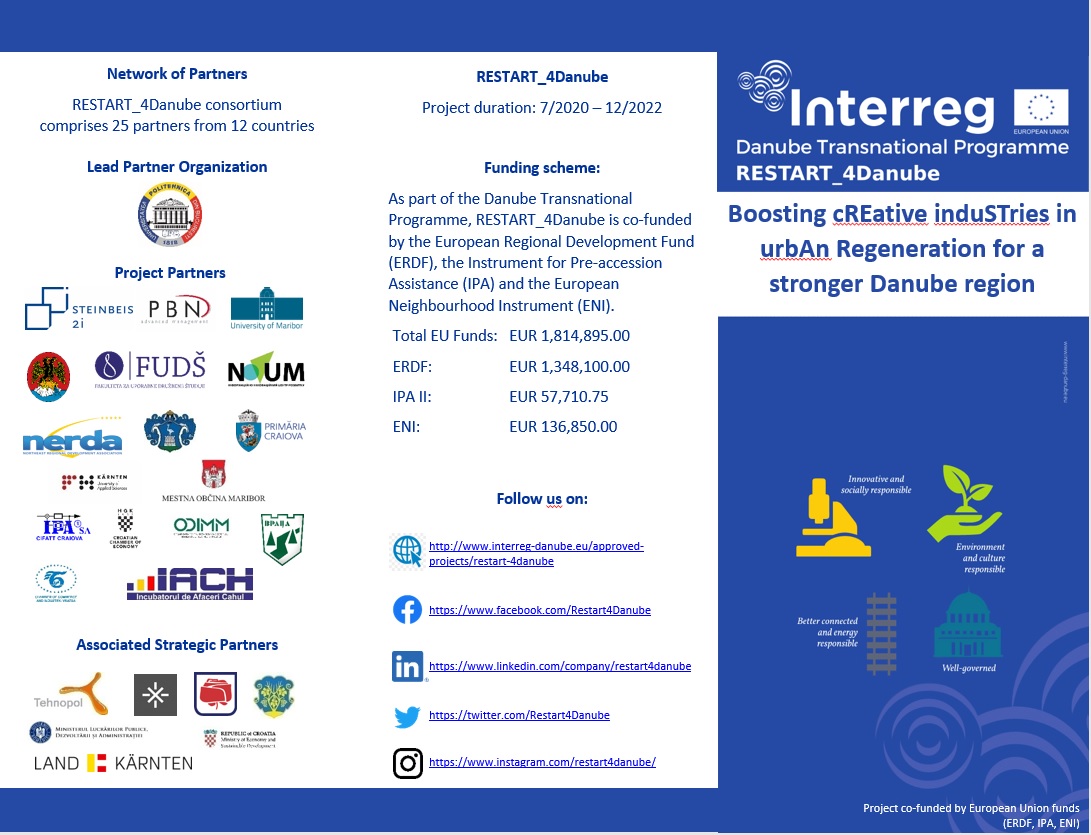 |
| |
|
Project partner Steinbeis 2i GmbH is currently preparing a brochure synthesizing the main activities and results of our project. It will highlight what we achieved in 2,5 years in terms of stakeholder involvement, cooperation and networking, capacity building, local action plan implementation, exchange of experience and good practice and political awareness.
The brochure will be ready in the near future for download from our project website, so stay tuned!
|
|
| |
|
Home straight for our common strategy on creative urban regeneration for the Danube region!
|
| |
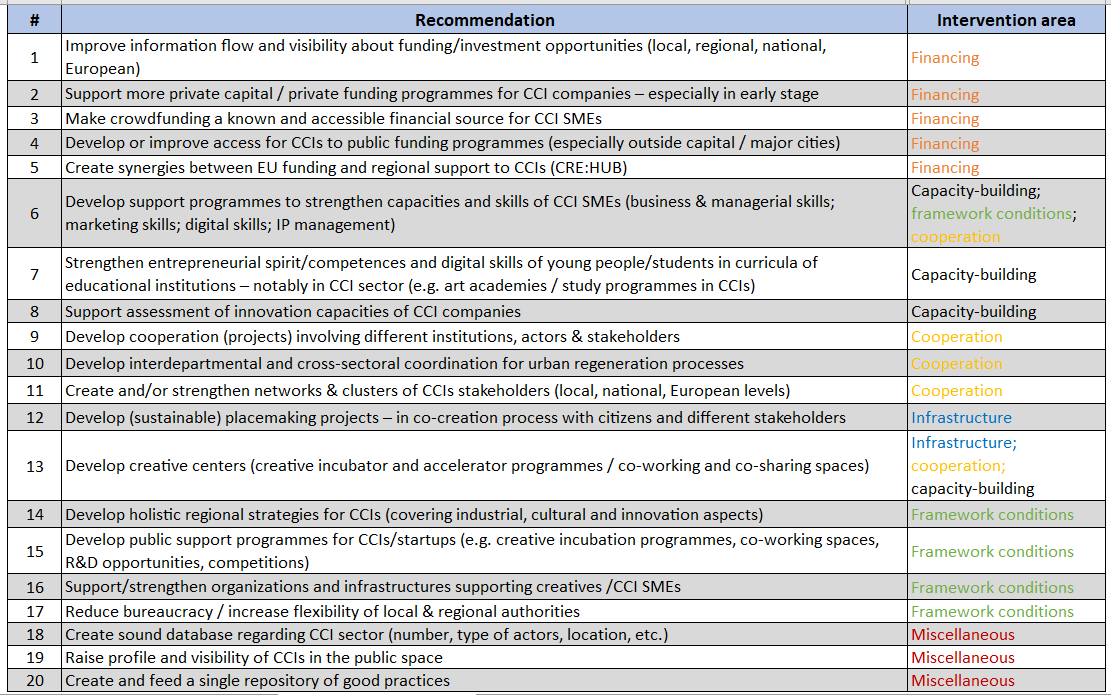 |
| |
|
RESTART_4Danube is in the process of finalizing its Common strategy on creative urban regeneration for the Danube region. With this strategy, the consortium hopes to provide concrete (policy) recommendations and measures to take in order to support CCI SMEs, strengthen the regional creative ecosystem through increased cooperation and synergies between stakeholders (at local, national & international levels), better embed the CCI sector in urban planning and processes and unleash the potential of the CCI sector – especially in the aspects of sustainable (sub)urban regeneration and (sub)urban development.
A great opportunity to hear more about our strategy and its 20 recommendations will be our final conference on 17-18 November!
|
|
|
We hoped you enjoyed the reading, got some food for thoughts and got motivated for further projects and collaborations.
The RESTART_4Danube consortium will attend two major events in the upcoming two months and would love to meet many of you there:
the 11th EUSDR Annual Forum on 19-20 October 2022 in Košice, Slovakia (and online) (https://danube-region.eu/11th-annual-forum-of-the-eu-strategy-for-the-danube-region/). The event is jointly organized by the Ukrainian EUSDR Presidency, the former Slovak EUSDR Presidency, the European Commission and the Danube Strategy Point
our final conference on 23-24 November 2022 in Chisinau, Moldova (and online)
In the meanwhile, we wish you a lot of success in your endeavours!
|
|
|
|
|
| |
|
If you have received this newsletter, you have been included on one or more of the Danube Transnational Programme/projects postal mailing lists. We are committed to respect and protect the privacy of personal data collected. We regard your personal data as confidential information and will never communicate it to third parties. Your personal data are used mainly for the express purpose of receiving the newsletter. Your mailing details may also be used by the DTP and its projects for information and dissemination purposes strictly related to the programme and its projects. If you prefer not to receive more of this newsletter and your data not to be used for dissemination purposes, you can unsubscribe by sending a reply email.
|
|
|
|
|
|
